Alfa Romeo Junior vs Mercedes EQE SUV – Performance, range & efficiency compared
Two cars, one duel: Alfa Romeo Junior meets Mercedes EQE SUV.
Which one wins in performance, efficiency and value for money? Find out now!
Costs and Efficiency:
Price and efficiency are key factors when choosing a car – and this is often where the real differences emerge.
Alfa Romeo Junior has a convincingly advantage in terms of price – it starts at 25700 £, while the Mercedes EQE SUV costs 71600 £. That’s a price difference of around 45882 £.
In terms of energy consumption, the advantage goes to the Alfa Romeo Junior: with 15.10 kWh per 100 km, it’s noticeable more efficient than the Mercedes EQE SUV with 18.30 kWh. That’s a difference of about 3.20 kWh.
As for range, the Mercedes EQE SUV performs clearly perceptible better – achieving up to 611 km, about 201 km more than the Alfa Romeo Junior.
Engine and Performance:
Power, torque and acceleration say a lot about how a car feels on the road. This is where you see which model delivers more driving dynamics.
When it comes to engine power, the Mercedes EQE SUV has a decisively edge – offering 625 HP compared to 280 HP. That’s roughly 345 HP more horsepower.
In acceleration from 0 to 100 km/h, the Mercedes EQE SUV is clearly quicker – completing the sprint in 3.70 s, while the Alfa Romeo Junior takes 5.90 s. That’s about 2.20 s faster.
In terms of top speed, the Mercedes EQE SUV performs somewhat better – reaching 240 km/h, while the Alfa Romeo Junior tops out at 206 km/h. The difference is around 34 km/h.
There’s also a difference in torque: Mercedes EQE SUV pulls convincingly stronger with 950 Nm compared to 345 Nm. That’s about 605 Nm difference.
Space and Everyday Use:
Beyond pure performance, interior space and usability matter most in daily life. This is where you see which car is more practical and versatile.
Both vehicles offer seating for 5 people.
In curb weight, Alfa Romeo Junior is convincingly lighter – 1380 kg compared to 2440 kg. The difference is around 1060 kg.
In terms of boot space, the Mercedes EQE SUV offers clearly perceptible more room – 520 L compared to 415 L. That’s a difference of about 105 L.
In maximum load capacity, the Mercedes EQE SUV performs clearly perceptible better – up to 1675 L, which is about 395 L more than the Alfa Romeo Junior.
When it comes to payload, Mercedes EQE SUV clearly perceptible takes the win – 580 kg compared to 420 kg. That’s a difference of about 160 kg.
Who wins the race?
The Mercedes EQE SUV proves to be dominates this comparison and therefore becomes our DriveDuel Champion!
Mercedes EQE SUV is the better all-rounder in this comparison.
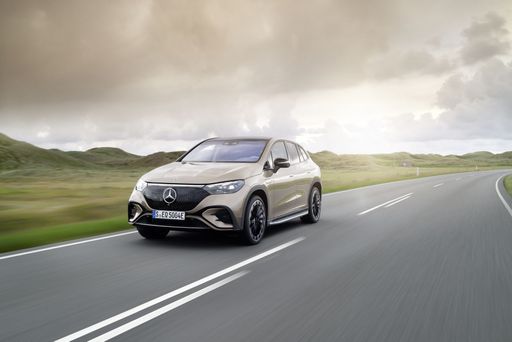 @ Mercedes-Benz Group Media
@ Mercedes-Benz Group Media
Mercedes EQE SUV
Alfa Romeo Junior
The Alfa Romeo Junior captures the essence of Italian design with its sleek lines and compact dimensions, making it an icon of elegance and performance. With a spirited driving experience and a charming retro aesthetic, it appeals to enthusiasts and casual drivers alike. This delightful car embodies the brand's rich heritage while remaining a fun and engaging option for those seeking a unique automotive experience.
details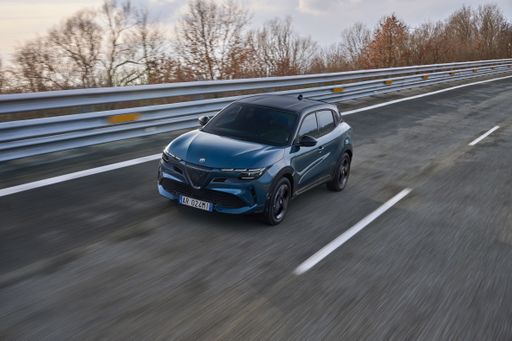 @ Alfa Romeo / Stellantis Media
@ Alfa Romeo / Stellantis Media
 @ Alfa Romeo / Stellantis Media
@ Alfa Romeo / Stellantis Media
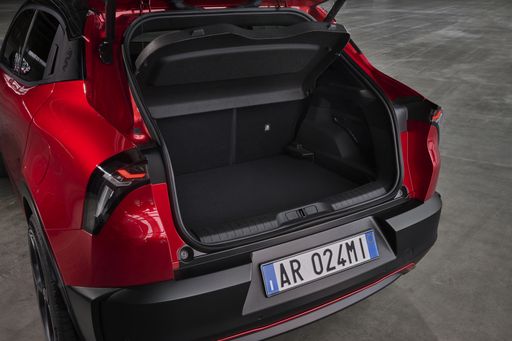 @ Alfa Romeo / Stellantis Media
@ Alfa Romeo / Stellantis Media
Mercedes EQE SUV
The Mercedes-Benz EQE SUV represents a fusion of advanced electric mobility and luxurious design, offering a refined driving experience that aligns with the brand's renowned legacy. Inside, the cabin is adorned with high-quality materials and state-of-the-art technology, providing both comfort and functionality for modern drivers. Its dynamic exterior is crafted to enhance aerodynamics while maintaining a distinctive and elegant presence on the road.
details @ Mercedes-Benz Group Media
@ Mercedes-Benz Group Media
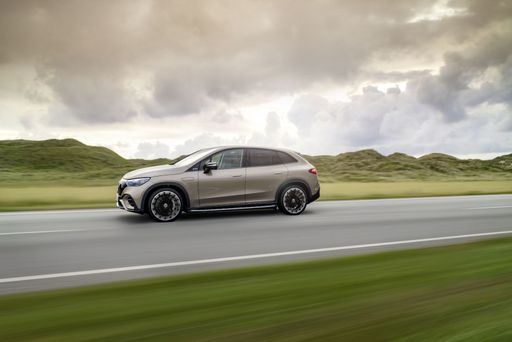 @ Mercedes-Benz Group Media
@ Mercedes-Benz Group Media
 @ Mercedes-Benz Group Media
@ Mercedes-Benz Group Media
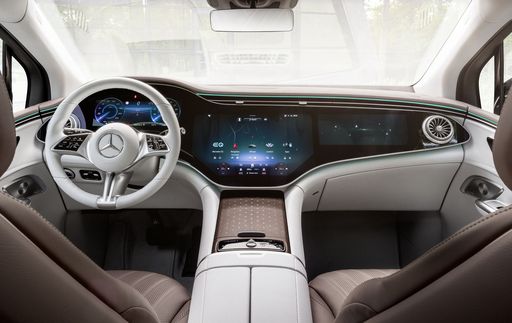 @ Mercedes-Benz Group Media
@ Mercedes-Benz Group Media
 @ Alfa Romeo / Stellantis Media
@ Alfa Romeo / Stellantis Media
|
 @ Mercedes-Benz Group Media
@ Mercedes-Benz Group Media
|
|
|
|
Costs and Consumption |
|
|---|---|
|
Price
25700 - 41600 £
|
Price
71600 - 125100 £
|
|
Consumption L/100km
4.8 - 5.4 L
|
Consumption L/100km
-
|
|
Consumption kWh/100km
15.1 - 17.5 kWh
|
Consumption kWh/100km
18.3 - 23.1 kWh
|
|
Electric Range
344 - 410 km
|
Electric Range
453 - 611 km
|
|
Battery Capacity
0.4 - 51 kWh
|
Battery Capacity
90.5 - 96 kWh
|
|
co2
0 - 119 g/km
|
co2
0 g/km
|
|
Fuel tank capacity
44 - 45 L
|
Fuel tank capacity
-
|
Dimensions and Body |
|
|---|---|
|
Body Type
SUV
|
Body Type
SUV
|
|
Seats
5
|
Seats
5
|
|
Doors
5
|
Doors
4
|
|
Curb weight
1380 - 1689 kg
|
Curb weight
2440 - 2615 kg
|
|
Trunk capacity
340 - 415 L
|
Trunk capacity
520 L
|
|
Length
4173 mm
|
Length
4863 - 4879 mm
|
|
Width
1781 mm
|
Width
1940 mm
|
|
Height
1505 - 1538 mm
|
Height
1672 - 1685 mm
|
|
Max trunk capacity
1205 - 1280 L
|
Max trunk capacity
1675 L
|
|
Payload
390 - 420 kg
|
Payload
505 - 580 kg
|
Engine and Performance |
|
|---|---|
|
Engine Type
Electric, Petrol MHEV
|
Engine Type
Electric
|
|
Transmission
Automatic
|
Transmission
Automatic
|
|
Transmission Detail
Dual-Clutch Automatic, Reduction Gearbox
|
Transmission Detail
Reduction Gearbox
|
|
Drive Type
Front-Wheel Drive, All-Wheel Drive
|
Drive Type
All-Wheel Drive, Rear-Wheel Drive
|
|
Power HP
136 - 280 HP
|
Power HP
265 - 625 HP
|
|
Acceleration 0-100km/h
5.9 - 9.1 s
|
Acceleration 0-100km/h
3.7 - 7.1 s
|
|
Max Speed
150 - 206 km/h
|
Max Speed
210 - 240 km/h
|
|
Torque
230 - 345 Nm
|
Torque
550 - 950 Nm
|
|
Number of Cylinders
3
|
Number of Cylinders
-
|
|
Power kW
100 - 207 kW
|
Power kW
195 - 460 kW
|
|
Engine capacity
1199 cm3
|
Engine capacity
-
|
General |
|
|---|---|
|
Model Year
2024 - 2025
|
Model Year
2023 - 2025
|
|
CO2 Efficiency Class
A, C, D
|
CO2 Efficiency Class
A
|
|
Brand
Alfa Romeo
|
Brand
Mercedes-Benz
|
What drive types are available for the Alfa Romeo Junior?
Available configurations include Front-Wheel Drive or All-Wheel Drive.
The prices and data displayed are estimates based on German list prices and may vary by country. This information is not legally binding.
